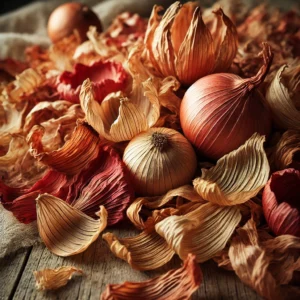Onion skins instead of plastic?
Single-use plastics are a huge problem worldwide, so more and more people are looking for solutions to find sustainable alternatives to packaging.

(Photo: AI)
A Scottish startup, HUID (skin in Dutch), set out to make environmentally friendly packaging materials from onion skins that can be composted at home. This new type of packaging can play an important role not only in reducing plastic waste, but also in the utilization of agricultural by-products. HUID’s work is also supported by the National Manufacturing Institute Scotland (NMIS) and the Advanced Materials Research Laboratory (AMRL) of the University of Strathclyde. They conduct various tests to investigate the performance, usability and environmental effects of packaging materials made from onion skins. The results so far are promising, HUID has already developed two prototypes – a cardboard-like material called Pyber and a flexible film called Cellofil, which can replace LDPE and PE films.
During the production process, cellulose is extracted from the skin of the onion, which is then converted into a biopolymer, creating a material that has a shelf life similar to that of plastic, yet is compostable
Among the unique properties of onion peel, it should be highlighted that it has natural antimicrobial properties that can help extend the shelf life of perishable foods. However, another characteristic feature of the raw material is not “inherited” by the packaging, namely its smell. According to the creators, the smell of the samples is very mild, rather sweet. HUID’s onion skin-based packaging can be a significant step towards a more sustainable economy and a future that requires less plastic and is a good example of how, with the help of creative innovation, something revolutionary can be created from even the simplest materials.
NAK/New Food Magazine
Related news
ESG: the majority don’t ask for postponement, preparedness level is increasing
🎧 Hallgasd a cikket: Lejátszás Szünet Folytatás Leállítás Nyelv: Auto…
Read more >Related news
II. Green Gastronomy – Marketing Communication Workshop organized by the MMSZ HoReCa and Green Section
🎧 Hallgasd a cikket: Lejátszás Szünet Folytatás Leállítás Nyelv: Auto…
Read more >









